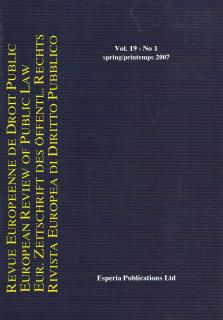
FROM NATIONAL CITIZENSHIP
TO EUROPEAN UNION CITIZENSHIP
THE RE-INVENTION OF CITIZENSHIP?
FLORA GOUDAPPEL
Professor at the Erasmus University Rotterdam, The Netherlands
While 'citizenship' is traditionally associated with the state and with the relation¬ship between the state and its inhabitants, this more traditional perception changed with the introduction of the notion of 'European Union citizenship' in the Treaty of Maastricht in 1992. After examining historical and philosophical aspects, methods of award of citizenship and the case law on European Union citizenship, the fol¬lowing conclusion can be taken. The introduction of the concept of a European Union citizenship has eventually led to a two-fold development. On the one hand, the official award of certain citizenship rights (and duties) to nationals of other states was a new concept because of the limitation to the nationals of the Member States of the European Union while excluding third-country nationals, and because the Court of Justice has given almost maximum substance to the concept. On the other hand, EU citizenship has given rise to limits in the concept of citizenship: free movement of persons between Member States was the key to the development of the concept.





















